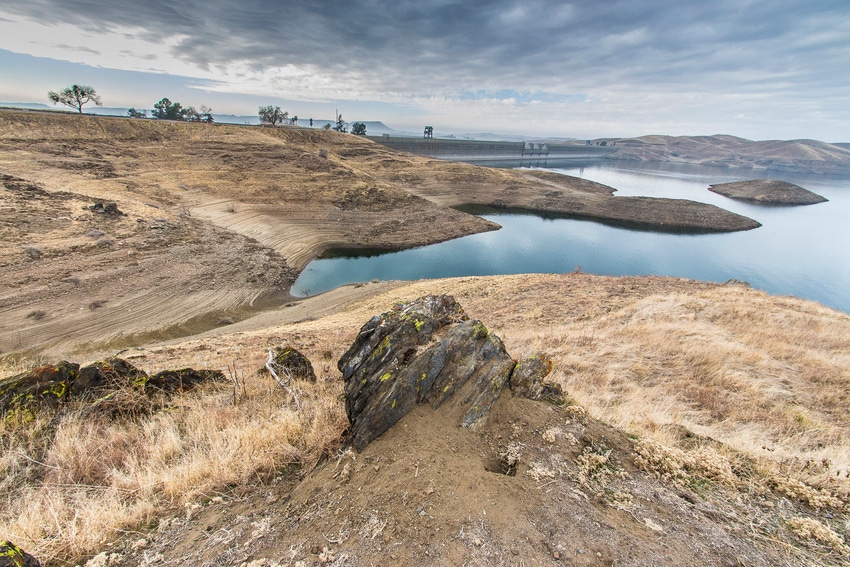May 20, 2014

California’s Friant Water Authority and many of its member water agencies want a federal judge to put an immediate stop to Bureau of Reclamation releases from Millerton Lake and seek other options to satisfy its legal obligation with senior water rights holders in the San Joaquin Valley.
The case has been assigned to Judge Lawrence J. O'Neill.
At issue is how the U.S. Bureau of Reclamation implemented terms of a long-standing contract with growers and the source of the water the USBR tapped to meet terms of a long-standing contract with a group of senior water rights holders commonly called the “exchange contractors.”
Earlier in May the USBR decided to convey Central Valley Project (CVP) water from Friant Dam, down the San Joaquin River, to the exchange contractors on the west side of the San Joaquin Valley.
The eastern part of the San Joaquin Valley - from the Merced-Madera county line in the north to the foot of the Tehachapi Mountains in the south, stretches 200 miles with more than a million acres of irrigated land, most of which depends on the water behind Friant Dam.
Friant water is typically used to meet the needs of cities and growers along the valley’s east side between Chowchilla and Bakersfield. The USBR’s decision leaves zero water for east side growers and cities whose only source of water is the Friant-Kern Canal.
Friant Water Authority General Manager Ron Jacobsma criticized the government’s decision, saying water could have been taken from elsewhere in the Central Valley Project system to meet government contractual obligations with the exchange contractors.
“We want to be clear that our complaint is not against the Exchange Contractors,” Jacobsma stressed. “Our complaint is against the United States for failing to deliver the Exchange Contractors their substitute water supply.”
The filing asks the court to issue a temporary restraining order and pursue other remedies, according to Jennifer T. Buckman, Friant Water Authority General Counsel. She said there is a need for immediate action, which would direct Reclamation to use sources available to it to supply the Exchange Contractors with their substitute water.
“Trees and vines that haven't already been pushed out will soon begin dying without water and the Bureau of Reclamation will not provide water this year,” Buckman said.
Crops will die
Jacobsma said Friant water users “have tried for months to work with Reclamation and the state Department of Water Resources to improve water supply conditions for the Exchange Contractors and the Friant Division. We have made our concerns known but, even with the late season rain events, Reclamation would not take action to provide full substitute water to the Exchange Contractors.”
Instead, Jacobsma noted, Reclamation began releasing water from Friant Dam to supply the Exchange Contractors.
“That action is effectively taking all the Millerton Lake water supply that would otherwise have been available to keep tens of thousands of acres of permanent plantings - primarily citrus - alive,” Jacobsma said. “We had no choice but to take legal action to protect the water rights of the Friant Division water contractors and the farms and communities supported by that water.”
According to Buckman, Friant and its member districts have raised three issues for the court to consider:
The first claim asks the court to confirm the rights under the Friant contracts with Reclamation. Under these contracts, Reclamation promised it would not deliver any water to the Exchange Contractors from Millerton Lake “unless and until required by the terms of” the Exchange Contract. Reclamation also promised that it would not “knowingly and voluntarily” make decisions that prevent it from supplying substitute water to the Exchange Contractors. Reclamation promised each of the Friant contractors that if there were water available - whether from the Sacramento River and its tributaries or the Delta - the federal agency would never make a voluntary choice not to supply it.
The second claim alleges a violation of the Central Valley Project Improvement Act. The CVPIA provides for the Secretary of the Interior to enter into contracts with agencies administering wildlife refuges or entities that supply water to refuges. These include the Grassland Water District and Grassland Resource Conservation District, as well as the U.S. Fish and Wildlife Service. Water for these refuges is to come only from “Central Valley Project yield,” a statutory term defined as “delivery capability of the Central Valley Project . . . after . . . other flow and operational requirements imposed by terms and conditions existing in licenses, permits, and other agreements pertaining to the Central Valley Project under applicable state law existing at the time of enactment of this title have been met.” CVPIA § 3406(b)(2). In a series of prior court cases, courts have ruled that the amount of water necessary to provide to the Exchange Contractors as “substitute water” is not to be considered CVP yield under the CVPIA. Under the CVPIA, the marshes for migratory birds are to be supplied only after the Exchange Contractors’ substitute water requirements are first satisfied.
The third claim alleges a violation of the 1902 Reclamation Act, under which the Bureau of Reclamation was established. That law requires the United States to follow state water rights law, including the “first in time, first in right” rule. Here, the United States holds senior water rights to the water collected from the Delta at the Tracy Pumping Plant. By providing the water to junior rights holders - the State Water Project, or the wildlife refuges - the United States is allowing junior water users to line-jump, in violation of California’s system of water rights priorities. Instead, the United States should be serving the priority rights of the Exchange Contractors with the water it obtained as a San Joaquin River exchange supply.
You May Also Like




